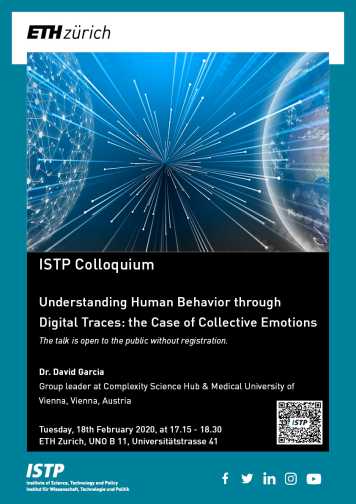Colloquium: Dr. David Garcia
Tuesday, 18th February 2020, at 17.15 - 18.30
ETH Zurich, UNO B 11, Universitätstrasse 41
Understanding Human Behavior through Digital Traces: the Case of Collective Emotions

After collective traumas such as natural disasters and terrorist attacks, members of concerned communities experience intense emotions and talk profusely about them. Although these exchanges resemble simple emotional venting, Durkheim’s theory of collective effervescence postulates that these collective emotions lead to higher levels of solidarity in the affected community.
We present the first large-scale test of this theory through the analysis of digital traces of 62,114 Twitter users after the Paris terrorist attacks of November 2015. We found a collective negative emotional response followed by a marked long-term increase in the use of lexical indicators related to solidarity. Expressions of social processes, prosocial behavior, and positive affect were higher in the months after the attacks for the individuals who participated to a higher degree in the collective emotion. Our findings support the conclusion that collective emotions after a disaster are associated with higher solidarity, revealing the social resilience of a community.
About Dr. David Garcia
David Garcia has been a group leader at the Complexity Science Hub Vienna since September 2017. The aim is to build a research group funded by WWTF (Vienna Research Groups for Young Investigators Call). He holds computer science degrees from Universidad Autonoma de Madrid (Spain) and ETH Zurich (Switzerland). David did a PhD and Postdoc at ETH Zurich, working at the chair of systems design.
David’s research focuses on computational social science, designing models and analysing human behaviour through digital traces. His main work revolves around the topics of emotions, cultures, and political polarization, combining statistical analyses of large datasets of online interaction with agent-based modeling of individual behaviour. His postdoctoral research on opinion polarization and online privacy has been funded by the Swiss National Science Foundation and the ETH Risk Centre.
His interdisciplinary collaborations span more than 50 co-authors in 12 countries. David has published more than 20 journal articles, 15 conference papers, and five book chapters, and serves as reviewer for prestigious journals and as program committee member of numerous computer science conferences.
- You can read a Summary of the Colloquium Talk on our Reports page.